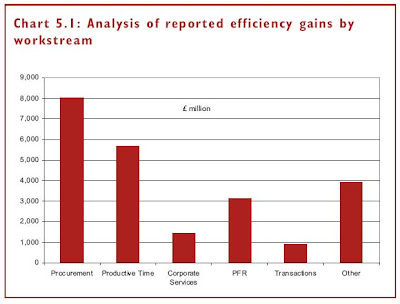We've blogged the fantasy Gershon "efficiency" programme many times (see all previous blogs gathered here). As you will recall, this was Brown's 2004 Budget headline to save £20bn pa by improving public sector efficiency by 2007-08.
Most of the subsequent "savings" have of course been pure fiction. The NAO concluded only one-quarter of the announced savings are "reliable", with the rest comprising deckchair rearrangement or service cuts (many of which- such as kicking patients out of hospital early- have expenditure increasing knock-ons). Worse, the programme has spawned its own Whitehall "Gershon" industry, inflating costs even more.
This morning BBC R4 Today interviewed Sir Peter Gershon himself about the whole nonsense.
Asked about that damning NAO report, Gershon pleaded the old "leading edge/frontiers of knowledge" defence - measures of success have had to be developed from scratch, so of course there are a few rough edges. He also threw in the "long-term" defence - the first three years are just a downpayment on a thousand years of efficiency (OK , ten years).
And could he name one tangible real world saving? Yes, he could- NHS procurement of pharmaceuticals, where £1.3bn had been saved over three years.
Procurement. An interesting answer, reflecting the latest scorecard presented by the Treasury alongside the Budget (see chart above).
As BOM readers will know, the Simple Shopper spends getting on for £200bn pa on procurement, and routinely pays way over the odds for everything from spy planes to post-it notes. So there's definitely scope for improvement.
Do we believe the Treasury numbers? Even if we do, buying more cheaply from external suppliers is not really what we'd call an efficiency gain. It's simply exercising the Big Buyer Power that Tesco and Sainsbury have been wielding for years. The real business of efficiency is reorganising working practices to produce the same (or better) stuff more cheaply. There is no evidence Gershon has cracked that.
